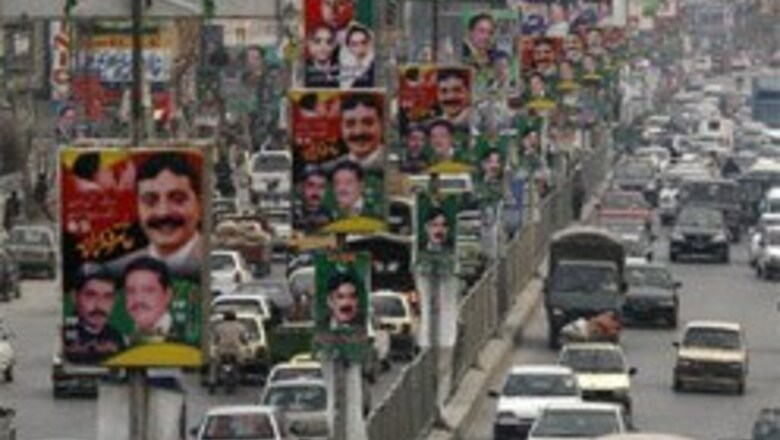
views
Peshawar: Athlas Khan says he wants to vote for people who are honest in Pakistan's upcoming general elections.
Sporting a warm smile from under his turban, the elderly rickshaw driver adds that he wants to vote for those who are working for Allah and Prophet Mohammad.
"They are the book people," he says, while he is waiting for passengers in Malakrao, a suburb of Peshawar.
For Khan, the book people are not just a figure of speech. The party he supports, the religious alliance Mutthida Majlis-e-Amal (MMA) carries the book as an election symbol.
Khan is not the only one who votes for a symbol, says Faizullah Jan, a lecturer of mass communication at Peshawar University.
Symbols are one of the primary elements people vote for, says lecturer Jan, who is unrelated to the rickshaw driver. Candidates' personalities and the political parties' platforms also are key factors to woo voters.
"The voters do not know the parties by their names, but by their symbols," says Jan, citing illiteracy as a reason.
Mohammad Sadiq, a 20-year-old farmer, underscores this. "I belong to the football," he says, when asked what party he will vote for. An independent candidate formerly affiliated with the MMA uses the symbol of the football. "I like the lantern also, but the leaders in my family said I have to vote for the football."
Tossing for the crescent
Voters need election symbols, says Iftikhar Shah, the Deputy Secretary of Pakistan's Election Commission. The literacy rate in Pakistan is about 54 per cent, according to government figures.
"It is done for the illiterate people. They cannot read, but they can see the ... the tiger, they can see the elephant." The streets of Pakistan's cities are littered with symbols on posters, hats, walls and cars.
Pakistan's Election Commission allots symbols to the political parties, Shah says. The parties get the symbols they had in the last elections. Lots are drawn to decide between parties wanting the same symbol.
There are 146 symbols, according to the Election Commission; political parties carry 47, while independent candidates possess the rest.
PAGE_BREAK
The Pakistan People's Party (PPP) of slain Benazir Bhutto has an arrow. A tiger symbolizes the Pakistan Muslim League-Nawaz (PML-N) of former premier Nawaz Sharif.
And the former ruling party Pakistan Muslim League-Q (PML-Q) carries a cycle.
Pakistan first became acquainted with election symbols in the general elections of 1935, when it was still called British India, said Dr Ijaz Shafi Gilani, chairman of marketing research bureau Gallup Pakistan.
"They choose this, because the literacy rate was only 15 percent," Gilani said. But voting rights was only for landowners, he says. The symbol's political relevance began with Pakistan's first general elections in 1970, he says.
Taking on the elephant
Political symbols inspire slogans and cartoons, Gilani said.
"There are cartoons in which Nawaz Sharif says that the cycle (of the ruling PML-Q) will be punctured and others say that the tiger (of Sharif's party) is a jackal."
The 54-year old electrician Abdul Khan says that workers of the Awami National Party (ANP), an ethnic Pashtun party, in his area actively use its lantern symbol. "They say it will bring light into the darkness and into your family."
Aid worker Naveed Khan says that election symbols are used in daily language.
His family, for example, will vote for the lantern of the ANP, but his brother will vote for a deeva, a traditional Pakistani lantern without a protectionist casket from the wind.
"My father told me that my brother is bringing the deeva. But the deeva blows out with a little wind, so I bring a lantern for him," he said.
The psychological importance of a symbol can help a candidate win or lose a vote, said Jan, the university lecturer.
"An independent candidate in my area has the symbol elephant. He said I have ... an election symbol, which is impossible to throw over."
"There is a saying in Pastho that you can't take on an elephant," Jan said, referring to the local language of the Pashtuns in the western border provinces alongside Afghanistan.
For some children the election symbols are pure enjoyment. Mohammed Nabil, 10, says he is in favor of Nawaz Sharif.
Asked why, he says: "I like the tiger." Then he goes onto selling sweet potatoes to his young, some barefooted customers, from behind a wooden pull-cart of nearly half his height in the small street.
Khan, the rickshaw driver, said he is convinced the symbol used by the MMA is a religious book, an important factor for him for deciding political allegiance. As head of his conservative family, Khan said he decided that the rest of his family should also vote for it.
















Comments
0 comment